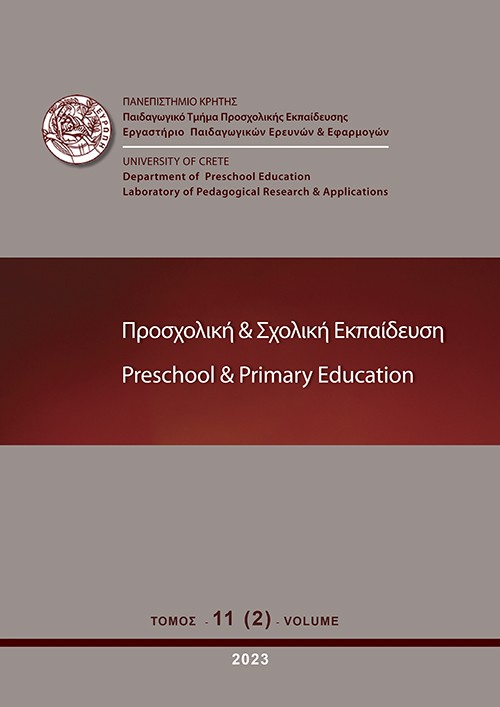Πατέρες παιδιών με εγκεφαλική παράλυση και οικογενειακή λειτουργία

Περίληψη
Η εργασία πραγματεύεται την οικογενειακή λειτουργία όπως την αξιολογούν οι πατέρες που μεγαλώνουν ένα παιδί με εγκεφαλική παράλυση (ΕΠ) στην Ελλάδα και την Ιταλία. Ειδικότερα, εξετάζει το πώς νοηματοδοτούν την ΕΠ και την πατρότητα καθώς και τα χαρακτηριστικά και τις βασικές παραμέτρους (συνοχή, προσαρμοστικότητα, τύπος οικογένειας) της οικογενειακής λειτουργίας. Συμμετείχαν συνολικά 60 πατέρες (30 Έλληνες και 30 Ιταλοί) ηλικίας 28 έως 59 ετών. Για τη συλλογή των δεδομένων χορηγήθηκαν ένα Ερωτηματολόγιο Κοινωνικό-δημογραφικών Στοιχείων, η Κλίμακα Εκτίμησης Προσαρμοστικότητας και Συνοχής στην Οικογένεια και μια Ημι-δομημένη Συνέντευξη. Τα αποτελέσματα ανέδειξαν ότι οι πατέρες στην Ελλάδα και την Ιταλία είχαν ποικίλες νοηματοδοτήσεις για την ΕΠ, με κυρίαρχη αυτήν που τη θεωρεί ένα ιατρικό πρόβλημα, το οποίο επηρεάζει όλη την οικογένεια. Οι πατέρες παρουσίασαν κοινά βιώματα και εμπειρίες για τη λειτουργία της οικογένειας και ανέφεραν θετικά και αρνητικά χαρακτηριστικά της οικογενειακής λειτουργίας. Η πλειονότητα των πατέρων βρέθηκε να αξιολογεί και να επιθυμεί έναν ισορροπημένο τύπο οικογένειας και αυτό ανήκει στην υγιή οικογενειακή λειτουργία, σύμφωνα με την αναθεωρημένη έκδοση του Μοντέλου Κυκλικής Συνθετότητας. H μελέτη διαπιστώνει ότι οι πατέρες είχαν μεν ποικίλες και διακριτές νοηματοδοτήσεις για την ΕΠ και την οικογενειακή λειτουργία, ωστόσο, οι νοηματοδοτήσεις αυτές αξιολογούνται ως λειτουργικές και αυτό συνιστά έναν προστατευτικό παράγοντα για όλο το οικογενειακό σύστημα.
Λεπτομέρειες άρθρου
- Πώς να δημιουργήσετε Αναφορές
-
Τσιμπιδάκη Α. (2023). Πατέρες παιδιών με εγκεφαλική παράλυση και οικογενειακή λειτουργία. Preschool and Primary Education, 11(2), 238–261. https://doi.org/10.12681/ppej.31682
- Ενότητα
- Άρθρα

Αυτή η εργασία είναι αδειοδοτημένη υπό το CC Αναφορά Δημιουργού – Μη Εμπορική Χρήση – Παρόμοια Διανομή 4.0.
Οι συγγραφείς των άρθρων που δημοσιεύονται στο ΠΡΟΣΧΟΛΙΚΗ & ΣΧΟΛΙΚΗ ΕΚΠΑΙΔΕΥΣΗ διατηρούν τα δικαιώματα πνευματικής ιδιοκτησίας επί των άρθρων τους, δίνοντας στο περιοδικό το δικαίωμα της πρώτης δημοσίευσης. Άρθρα που δημοσιεύονται στο ΠΡΟΣΧΟΛΙΚΗ & ΣΧΟΛΙΚΗ ΕΚΠΑΙΔΕΥΣΗ διατίθενται με άδεια Creative Commons 3.0 και σύμφωνα με την άδεια μπορούν να χρησιμοποιούνται ελεύθερα, με αναφορά στο/στη συγγραφέα και στην πρώτη δημοσίευση για μη κερδοσκοπικούς σκοπούς και με δικαίωμα τροποποίησης μόνον με παρόμοια διανομή (αν αναμείξετε, τροποποιήσετε, ή δημιουργήσετε πάνω στο υλικό, πρέπει να διανείμετε τις δικές σας συνεισφορές υπό την ίδια άδεια όπως και το πρωτότυπο). To Εργαστήριο Παιδαγωγικών Ερευνών και Εφαρμογών του Παιδαγωγικού Τμήματος Προσχολικής Εκπαίδευσης του Πανεπιστημίου Κρήτης και το Εθνικό Κέντρο Τεκμηρίωσης διατηρούν το δικαίωμα να δημοσιεύουν, να αναπαραγάγουν, να παρουσιάζουν στο κοινό, να διανέμουν και χρησιμοποιούν άρθρα που δημοσιεύονται στο ΠΡΟΣΧΟΛΙΚΗ & ΣΧΟΛΙΚΗ ΕΚΠΑΙΔΕΥΣΗ σε οποιοδήποτε μέσο και μορφή είτε μεμονωμένα είτε ως μέρη συλλογικών έργων, για όλο το χρόνο διάρκειας προστασίας της πνευματικής ιδιοκτησίας και για όλες τις χώρες του κόσμου. Αυτό περιλαμβάνει ενδεικτικά και όχι αποκλειστικά, το δικαίωμα δημοσίευσης των άρθρων σε τεύχη του περιοδικού ΠΡΟΣΧΟΛΙΚΗ & ΣΧΟΛΙΚΗ ΕΚΠΑΙΔΕΥΣΗ, αναπαραγωγής και διανομής μεμονωμένων αντιγράφων των άρθρων, αναπαραγωγής ολόκληρων των άρθρων σε άλλη έκδοση του Εργαστηρίου Παιδαγωγικών Ερευνών και Εφαρμογών του Παιδαγωγικού Τμήματος Προσχολικής Εκπαίδευσης του Πανεπιστημίου Κρήτης και του Εθνικού Κέντρου Τεκμηρίωσης και αναπαραγωγής και διανομής των άρθρων ή περίληψης αυτών με χρήση πληροφορικού συστήματος αποθετηρίου.


